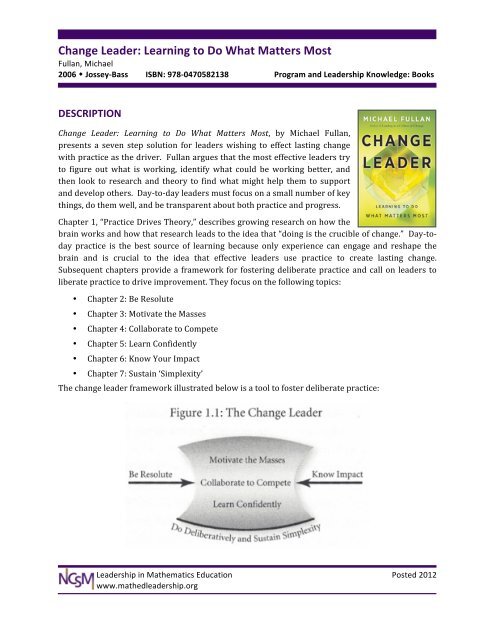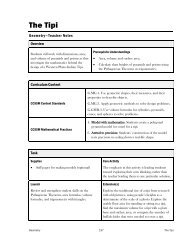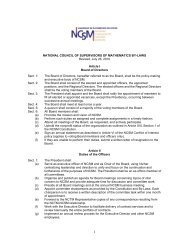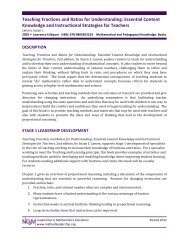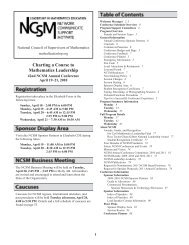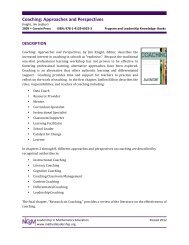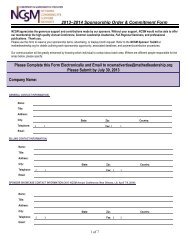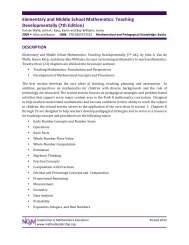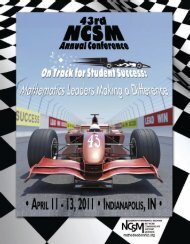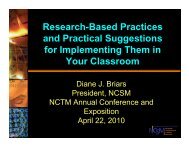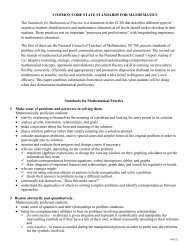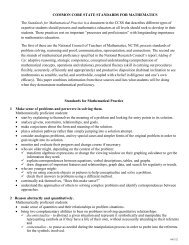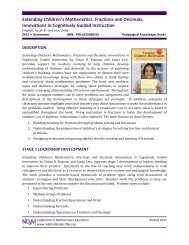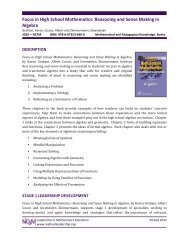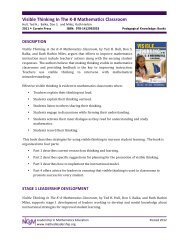Change Leader: Learning to Do What Matters Most - NCSM
Change Leader: Learning to Do What Matters Most - NCSM
Change Leader: Learning to Do What Matters Most - NCSM
You also want an ePaper? Increase the reach of your titles
YUMPU automatically turns print PDFs into web optimized ePapers that Google loves.
<strong>Change</strong> <strong>Leader</strong>: <strong>Learning</strong> <strong>to</strong> <strong>Do</strong> <strong>What</strong> <strong>Matters</strong> <strong>Most</strong> Fullan, Michael 2006 w Jossey-‐Bass ISBN: 978-‐0470582138 Program and <strong>Leader</strong>ship Knowledge: Books DESCRIPTION <strong>Change</strong> <strong>Leader</strong>: <strong>Learning</strong> <strong>to</strong> <strong>Do</strong> <strong>What</strong> <strong>Matters</strong> <strong>Most</strong>, by Michael Fullan, presents a seven step solution for leaders wishing <strong>to</strong> effect lasting change with practice as the driver. Fullan argues that the most effective leaders try <strong>to</strong> figure out what is working, identify what could be working better, and then look <strong>to</strong> research and theory <strong>to</strong> find what might help them <strong>to</strong> support and develop others. Day-‐<strong>to</strong>-‐day leaders must focus on a small number of key things, do them well, and be transparent about both practice and progress. Chapter 1, “Practice Drives Theory,” describes growing research on how the brain works and how that research leads <strong>to</strong> the idea that “doing is the crucible of change.” Day-‐<strong>to</strong>-day practice is the best source of learning because only experience can engage and reshape the brain and is crucial <strong>to</strong> the idea that effective leaders use practice <strong>to</strong> create lasting change. Subsequent chapters provide a framework for fostering deliberate practice and call on leaders <strong>to</strong> liberate practice <strong>to</strong> drive improvement. They focus on the following <strong>to</strong>pics: • Chapter 2: Be Resolute • Chapter 3: Motivate the Masses • Chapter 4: Collaborate <strong>to</strong> Compete • Chapter 5: Learn Confidently • Chapter 6: Know Your Impact • Chapter 7: Sustain ‘Simplexity’ The change leader framework illustrated below is a <strong>to</strong>ol <strong>to</strong> foster deliberate practice: <strong>Leader</strong>ship in Mathematics Education www.mathedleadership.org Posted 2012
STAGE 2 LEADERSHIP DEVELOPMENT <strong>Change</strong> <strong>Leader</strong>: <strong>Learning</strong> <strong>to</strong> <strong>Do</strong> <strong>What</strong> <strong>Matters</strong> <strong>Most</strong>, by Michael Fullan, supports stage 2 leadership development of specialists interested in knowing and modeling leadership skills. Leading through practice as described in this book supports the work of a mathematics specialist providing services <strong>to</strong> individuals, schools, or even districts. Asking the questions “<strong>What</strong> do people do every day?” and “How can we improve it?” are valuable <strong>to</strong> the specialist building knowledge and <strong>to</strong> the specialist leading others <strong>to</strong> build knowledge. The philosophy of Fullan, that effective leaders use practice as their learning ground, supports the idea that a math specialist builds from strength and models being a lifelong learner. Math specialists wishing <strong>to</strong> effect change in the practice of others <strong>to</strong> improve student achievement will find this framework a valuable resource. Being a leader is not easy, and being a mathematics coach, a mathematics leader in a school, is not easy. Fullan outlines six practices – Earn Trust, Fine-‐Tune Focus, Develop Others, Know Your Impact, Embrace Complexity, and Hope No Matter <strong>What</strong> – that a math coach will find valuable. Leading a school <strong>to</strong>ward the principles described in The PRIME <strong>Leader</strong>ship Framework, <strong>NCSM</strong> requires knowledge of equity, teaching, learning, curriculum, and assessment and also requires skill in being a change leader. In addition <strong>to</strong> the book, coaches may read an unpublished article from http://www.michaelfullan.ca called “<strong>Learning</strong> is the Work” (July, 2011), which provides examples of changing schools focused on issues or equity and student achievement. <strong>Leader</strong>ship in Mathematics Education www.mathedleadership.org Posted 2012


